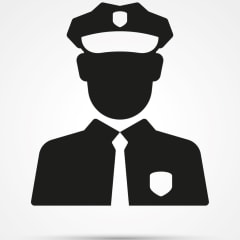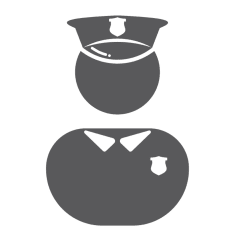Best Criminal Justice Careers
For a graduate of criminal justice, the career outlook couldn't look brighter. Spanning three sectors—law enforcement, criminality, and corrections—this major provides students with a broad knowledge of the criminal justice system. Over the course of their degree, they learn why crime occurs on both a societal and individual level, discuss different tactics for responding to it, and develop an understanding of the perspectives of front-line professionals, community members, offenders, and others who are affected by the criminal justice system.
But criminal justice majors gain more than just knowledge during their studies. They also develop essential research skills, practice applying ethical standards to a wide range of criminal issues, build strong communication abilities, and learn to collaborate with diverse teams. These skills, together with their nuanced understanding of criminality, can prove invaluable in many careers—both within the criminal justice sector and beyond.
This article will be covering the following careers:
| Career | Avg Salary | Satisfaction | Your Match |
|---|---|---|---|
| Probation Officer | $41k | 3.1/5 | |
| Judge | $231k | 4.2/5 | |
| Private Detective | $60k | 3.5/5 | |
| Social Worker | $46k | 2.9/5 | |
| Forensic Science Technician | $35k | 3.6/5 | |
| Paralegal | $47k | 2.7/5 | |
| Police Officer | $61k | 3.3/5 | |
| Correctional Officer | $41k | 2.4/5 | |
| Security Guard | $17k | 2.7/5 |
Are these careers suited to you? Our comprehensive career test measures your personality traits and interests and matches you to over 800 careers.
1. Probation Officer
Equal parts supervisory and supportive, the role of probation officer is both challenging and rewarding. The position involves monitoring offenders after they have been released from the corrections system to ensure they meet the terms of their probation. But it also entails helping offenders readjust to life in society by pointing them to treatment options, connecting them with resources, and meeting regularly to discuss their progress. Criminal justice majors will enjoy using their knowledge and skills to contribute to the betterment of society in this important career.

Probation Officer
A probation officer plays an important role in the criminal justice system by supervising individuals who have been placed on probation as an alternative to incarceration or as part of their sentence.
2. Judge
Judges are at the heart of the criminal justice system. These experienced professionals preside over court cases of all kinds, hearing evidence and testimony, providing instruction to members of the jury, determining sentences, and more. Judges ensure that all courtroom proceedings are carried out in accordance with the law, playing a pivotal role in the outcome of any trial. Becoming a judge does require extensive training—including a law degree and several years of professional practice—but for individuals with a passion for justice, it can be an incredibly rewarding career choice.

Judge
A judge is an authoritative figure within the legal system who presides over court proceedings and is responsible for ensuring justice is served.
3. Private Detective
Criminal justice is the most common degree held by practicing detectives. These clever, inquisitive professionals spend their careers solving problems, crimes, and other mysteries for clients of all kinds. On any given day, a private detective might find themselves investigating a missing persons case, conducting an in-depth background check on a suspicious individual, or identifying illegal computer activities. Constantly changing, becoming a "private eye" is one of the most unique career paths available to a criminal justice major.

Private Detective
A private detective is hired by individuals, businesses, or legal entities to conduct investigative tasks on a private basis.
4. Social Worker
For empathetic criminal justice majors with a desire to help others, a career in social work can be a natural next step. Social workers help individuals, families, communities, and organizations overcome key challenges and function better within society at large. This career can take many directions, as clients can range from individuals struggling with mental health issues to those who are chronically unemployed. With their deep knowledge of criminality, criminal justice majors are ideally suited to assist clients with a criminal background find jobs, access treatment, and eventually readjust to society.

Social Worker
Social workers are dedicated to helping people overcome personal and societal obstacles by providing support, resources, and advocacy.
5. Forensic Science Technician
Forensic science technicians play an essential role in the criminal justice system. These highly trained professionals work with evidence found at the scene of a crime, collecting, analyzing, and testing it for clues and information. Although educational requirements vary from employer to employer, typically a mix of scientific and criminal knowledge is required. Not a career for the feint of heart, those interested in this line of work should be aware that they will likely witness graphic content on a regular basis. Nevertheless, many criminal justice majors find a natural fit in this intellectually stimulating and varied work.

Forensic Science Technician
A forensic science technician, also known as a crime scene investigator (CSI), plays a vital role in collecting, analyzing, and preserving physical evidence from crime scenes.
6. Paralegal
Paralegal employment opportunities are on the rise, with an expected growth of 15 percent by 2026. Criminal justice majors, with their in-depth knowledge of criminality and the justice system, are ideally suited to this rigorous career. As a paralegal at a criminal law firm, they would put their research and communication skills to use: interviewing co-defendants and witnesses, reviewing past case information and crime scene data, drafting paperwork, and more. Although, in some cases, an associate's degree in paralegal studies is required, in others, it is possible to become a paralegal with only a bachelor's in criminal justice.
7. Police Officer
Police officers perform an important role in their communities. They help to maintain law and order, prevent and penalize criminal behaviour, and ensure that residents feel as safe and secure as possible. On a daily basis, they might find themselves responding to calls, arresting individuals, patrolling their assigned region, issuing citations, or testifying in court cases. A varied and meaningful profession, it's no wonder police officer is one of the most popular professions held by criminal justice majors.

Police Officer
A police officer is responsible for maintaining public safety, enforcing laws, and protecting the community.
8. Correctional Officer
Correctional officers are the voice of authority within the world's prisons and jails. These brave law enforcement professionals are responsible for maintaining order within the establishment, as well as ensuring the welfare and safety of all prisoners. This work can involve tasks such as disrupting violent confrontations, guarding or monitoring problematic individuals, or providing rehabilitative assistance to prisoners who are nearing the end of their term. Although this profession can be emotionally, mentally, and even physically challenging, many criminal justice majors will find the work meaningful and engaging.

Correctional Officer
A correctional officer is responsible for maintaining security and order within correctional facilities such as prisons, jails, and detention centers.
9. Security Guard
Security guards are employed in a wide range of settings, including banks, hospitals, theme parks, museums, and more. They monitor individuals, buildings, and private properties to help prevent theft, vandalism, terrorism, and other crimes. As a security guard, there's no telling whether the day will be completely routine or filled with adrenaline—an element of variety that attracts many to the job. Criminal justice graduates possess a deep understanding of how, when, and why crimes occur—exactly the knowledge needed to excel in this career.

Security Guard
A security guard is responsible for maintaining a safe and secure environment in various settings, such as commercial properties, residential complexes, events, and public spaces.
